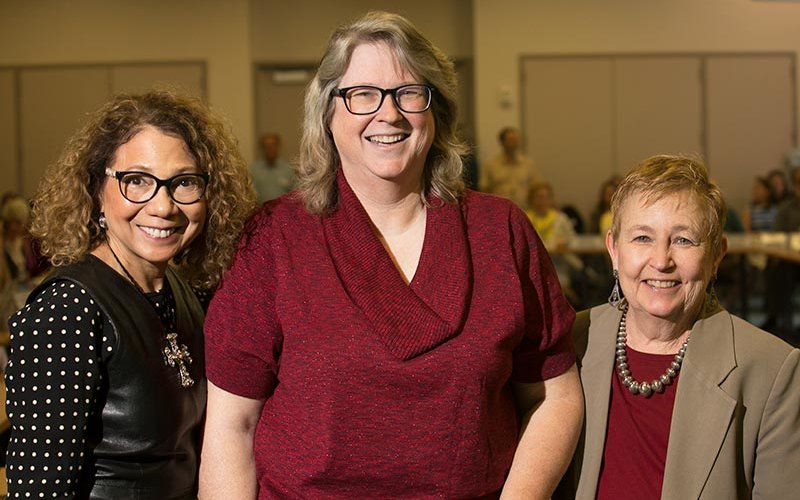
Merri Lynn Casem’s mother was a teacher, as were her aunts. There was “no way” the alumna was ever going to be a teacher. But as an undergraduate student, Eugene Jones, professor emeritus of biological science, suggested she help out with a course she had taken previously.
“And I caught the teaching bug. It was every experience I had here as a student at Cal State Fullerton that turned me into a Ph.D., a faculty member… and I’ve always made a promise to myself to give back to the campus the way it gave to me,” she says.
On May 11, the professor of biological science and director of Non-majors Biology Education received the Carol Barnes Excellence in Teaching Award, which honors faculty members who demonstrate academic rigor in teaching consistent with the University’s mission and that of the California State University.
High marks from students and peers alike, says Sean Walker, chair and professor of biological science, “reflect her commitment to providing a high-quality learning experience for every student and the intentionality with which she designs activities, exams, syllabi, courses and curriculum.”
“Although Merri Lynn receives excellent evaluations from students and peers, she persistently strives to improve her teaching, help students learn, and provides excellent mentorship to students and faculty.”
A key player in the Chancellor’s Office course redesign efforts for introductory courses, Casem also has supported two major curriculum redesign efforts within her department, and has twice received funding from the National Science Foundation Course, Curriculum and Laboratory Improvement Program.
Casem’s engagement in instructional design conforms to her belief in continually revisiting and improving her courses, which are all student-centered, active-learning environments. The professor instituted Connect, Synthesize, Understand Fridays — CSUFridays — to introduce her students to “the culture of science” through activities based on data derived from scientific literature. She also has developed supplemental resources to reinforce and expand students’ understanding, including workbooks and inquiry-based lab modules.
“She is a mentor to not only her undergraduate students and graduate teaching associates, but also our junior faculty members, many of whom wrote letters of support for her to receive this award,” said Cal State Fullerton President Mildred García. “She is a true Titan who works incredibly hard to ensure that learning is — and always will be — preeminent at Cal State Fullerton.”
Casem’s peer-reviewed, primary research in the field of biology education and curricular innovation has led to her authoring the first of the “Problem Sets in Biology and Biomedical Science” series, as well as her inclusion in “Case Studies in Cell Biology.”
Ellie Herrera ’13, ‘15 (B.S. biological science-cell and developmental biology, M.S. biology) credits Casem for changing her life through her mentorship, research opportunities and encouragement.
“… She embraces current pedagogy literature and teaching styles. She turns the classroom into a safe place to rehearse ideas and grasp complex concepts, rather than a routine lecture covering what was already covered in the text,” says the adjunct professor of biology at Los Angeles Valley College.
Herrera’s collaboration with Casem in arachnid research, one of the award-winner’s main research areas, was chronicled in the Orange County Register in 2014.
“She taught me to never give up on a student who tries because, like me, they may just need a little encouragement to reach higher than they thought they could,” adds Herrera.
“There are teachers who may be as talented an instructor as she is, but I challenge you to find one who will take on the underdog like she does.”
Casem herself had her academic path altered by an inspiring instructor. “I started out as a liberal studies major because I wanted to learn about everything,” she says. “Then I took my Biology 101 course and that instructor, Marvin Rosenberg, was so fascinating and so fabulous that it changed my life. And because of that one instructor, I became a biology major.
“And because of subsequent instructors — Gene Jones, Bob Koch, Charlie Lambert — all of those people changed my life.”
“Merri Lynn’s approach to designing courses and curriculum includes a strong inquiry-based component involving research experiences and an emphasis on scientific literacy and constant assessment to understand how and what students are learning,” says Walker. “We know there are profound positive impacts of exposing lower-division students to authentic research experiences and, prior to the national call for inclusion of authentic research into the biology curriculum, she designed and implemented research-based modules in a first-year biology course.
In a letter supporting Casem for the Barnes Award, Kristy L. Forsgren and Melanie Sacco, assistant and associate professors of biological science, respectively, wrote: “She is a pioneer in our department for transferring the findings of biology education research into the biology classroom and developing her own innovative ideas to reach as many students as possible. Her passion for teaching and mentoring others in this endeavor is an inspiration.”
Casem began teaching at her alma mater in fall 2000 after spending five years as a visiting assistant professor of biology in the joint sciences department at the Claremont Colleges. She holds a Ph.D. in cellular and molecular biology from UC Riverside.